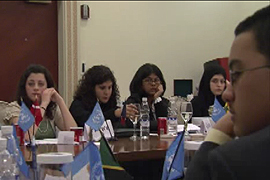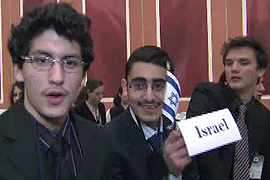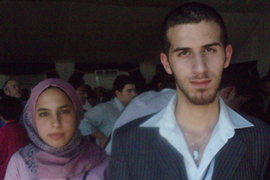Palestinian children embrace the UN
Students from Gaza sample diplomatic life but home truths affect their ambitions.

Organised by the Georgetown University School of Foreign Service in Qatar, the conference raised more intense and heart-felt debates than many other Model UN meetings.
It brought together students from schools in a Middle East beset by conflict.
|
“I saw how people are living differently, enjoying their time. In Gaza it’s all the time shooting and dying. It’s different” Al’a Hamouda, AISG |
For some Palestinian students, it was their first time leaving Gaza, in itself an eye-opening experience.
Al’a Hamouda, from the American International School of Gaza (AISG), said: “I saw how people are living differently, enjoying their time. In Gaza it’s all the time shooting and dying. It’s different.”
Alia Oriban, an AISG teacher, said: “Exposing the children from different cultures and societies has opened the minds of all the students.”
Young diplomats
For the children, it was a unique opportunity to take on the roles of senior diplomats.
Dana Al Kahlout, the mock “vice chair of the UN Security Council”, said the conference was a “window that we, as future leaders, can look through to see the world”.
 |
| Almost 450 students took part in the Model UN |
“It allows us to step into another person’s position and be them, act like them, understand them, and represent them well.”
But not all of the children were inspired to become tomorrow’s diplomats, particularly those from the occupied Palestinian territories.
Waseem Uschev, an AISG student, said: “It was a good experience, but I want to be an engineer.
“I don’t like wars and things like that. I want to be in my own business.”
Fellow student, Al’a, wanted to work in the emergency services. “We see many things like this so I guess it is not a surprise,” she said.
Border worries
AISG could not afford the journey to the first model UN conference in Cairo last year due to a lack of funds. But, the financial crisis in Gaza was not the only reason.
|
“If these kids were running the world, it would probably be a better place” Alia Oriban, AISG teacher |
Thankful that she was present at all during the conference, Alia said: “We were very blessed that the border was open.
“We never know when the border is open. The minute I crossed the Rafah border, I knew I was coming to Qatar.”
The American International School in Tel Aviv hosted a conference to which AISG were invited in 2005, but Alia pointed out that all but two of the students were refused entry.
One of those allowed to enter was picked up by the Israeli army and sent back after 24 hours.
She said: “Young people in Palestine between 18 and 35 have little hope of a good education firstly because many can’t afford it, and secondly, if they get scholarships elsewhere, they can’t leave.
“I have to explain to my kids what it feels like to be on a boat, on a rollercoaster, in a museum. Gaza has no theatre, no ballet, nothing.
|
“All that stands between us and whatever terrible abyss is out there is our ability to talk to each other” Tim Sebastian, journalist |
“As they grow, the kids lose their teenage years. Not because of lack of education, but because of overexposure.”
She described how Palestinian children can “differentiate between the bullets of a 100-calibre gun, a 1000-calibre gun,” and how “an F16 fighter aircraft over their head doesn’t even make them flinch”.
“All this exposure has stopped their natural journey from youth to maturity.”
Equal representation
The students’ hopes and aspirations in the mock conference echoed those of people everywhere.
 |
| Bahrainis Khalid and Jassim enjoyed their roles |
Two Arab students from Bahrain had to slip into somewhat uncomfortable shoes and represent Israel.
Jassim Al Aimer, from Bahrain Bayan School, said: “We got to socialise with some Israeli students who were okay. They were friendly, and it was a good experience.”
He, and fellow school friend Khalid Al Shawi, were driven by other global issues.
“I wish that world hunger is solved and no one is hungry in the world. I wish that the Iraqi conflict will end as soon as possible.”
But the situation on the ground for most Palestinian children is entirely different to that of the privileged surroundings of a Doha hotel.
Alia said: “When you try to tell the children that the majority of Israelis are normal people, in normal homes, watching television, it’s difficult for them to imagine them as anything but soldiers, as helicopter pilots, or tank drivers.”
Communication
Many of the Palestinian children from both Ramallah and Gaza, gathered around the table of the Israeli ambassador to Qatar. They asked questions about the poor conditions in Gaza, the fighting, and the future.
Two young Gazan students wanted to give the ambassador a badge of the Palestinian flag as a symbolic gesture.
Tim Sebastian, a veteran journalist, made a keynote address at the conference which, though sombre, inspired many of the students.
He said:
 |
| Al’a, left, and Khalid hope for a better future |
“All that stands between us and whatever terrible abyss is out there is our ability to talk to each other.
“If we can’t somehow urgently improve on those communication skills, generations are going to go on dying locked into the same cycle of violence that we have so conspicuously failed to break.”
Unfortunately for the students from Gaza, they will now have to spend a week in Cairo waiting for the Rafah border to open, before they can return to their school and their families.
But Alia reflected on a positive conference for the students.
“Everybody was here to try, to change, to revolutionise. I would love to see some of them in the real United Nations.
“If these kids were running the world, it would probably be a better place.”